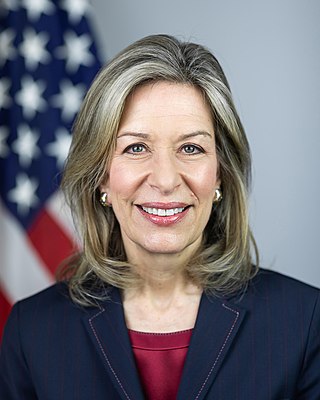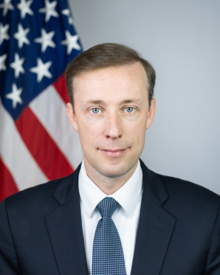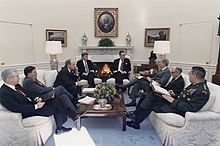
The United States National Security Council (NSC) is the principal forum used by the president of the United States for consideration of national security, military, and foreign policy matters. Based in the White House, it is part of the Executive Office of the President of the United States, and composed of senior national security advisors and Cabinet officials.

The Executive Office of the President of the United States (EOP) comprises the offices and agencies that support the work of the president at the center of the executive branch of the United States federal government. The office consists of several offices and agencies, such as the White House Office, the National Security Council, and the Office of Management and Budget.
The United States National Security council was established following the coordination of the foreign policy system in the United States in 1947 under the National Security Act of 1947. An administrative agency guiding national security issues was found to be needed since world war II. The national Security Act of 1947 provides the council with powers of setting up and adjusting foreign policies and reconcile diplomatic and military establishments. It established a Secretary of Defence, a National Military Establishment which serves as central intelligence agency and a National Security Resources Board. The specific structure of the United States National Security Council can be different depending on the elected party of the time. Different party emphasize on different aspects of policy making and administrating.

Brent Scowcroft was a United States Air Force officer who was a two-time United States National Security Advisor, first under U.S. President Gerald Ford and then under George H. W. Bush. He served as Military Assistant to President Richard Nixon and as Deputy Assistant to the President for National Security Affairs in the Nixon and Ford administrations. He served as Chairman of the President's Foreign Intelligence Advisory Board under President George W. Bush from 2001 to 2005, and advised President Barack Obama on choosing his national security team.

The National Security Council is a federal institutional and consultative body chaired by the Prime Minister of Pakistan as its chairman. The NSC is a principal forum that is mandated for considering national security and foreign policy matters with the senior national security advisers and Cabinet ministers. The idea and inception of National Security Council was first conceived in 1969 under the President Yahya Khan, its functions were to advise and assist the president and prime minister on national security and foreign policies.

Robert Rand Brittingham Beers is an American government official. He served as Deputy Homeland Security Advisor to the President of the United States during the Barack Obama administration. He also served as acting Secretary of Homeland Security following the resignation of Secretary Janet Napolitano on September 6, 2013 until Jeh Johnson assumed that office on December 23, 2013.

Stephen John Hadley is an American attorney and senior government official who served as the 20th United States National Security Advisor from 2005 to 2009. He served under President George W. Bush during the second term of his administration. Hadley was Deputy National Security Advisor during Bush's first term.
Kevin G. Nealer is an American businessperson and political figure. He is currently a principal and partner in The Scowcroft Group, specializing in financial services, risk analysis, direct investment and trade policy.

The Vulcans is a nickname used to refer to Republican presidential candidate George W. Bush's foreign policy advisory team assembled to brief him prior to the 2000 US presidential election.
The National Security Council Deputies Committee (DC) is a committee of the United States National Security Council and the senior sub-Cabinet interagency forum for consideration of national security policy issues by the United States Government.
Executive oversight of United States covert operations has been carried out by a series of sub-committees of the National Security Council (NSC).

The National Space Council is a body within the Executive Office of the President of the United States created in 1989 during the George H. W. Bush administration, disbanded in 1993, and reestablished in June 2017 by the Donald Trump administration. It is a modified version of the earlier National Aeronautics and Space Council (1958–1973).

Thomas Edward Donilon is an American lawyer, business executive, and former government official who served as the 22nd National Security Advisor in the Obama administration from 2010 to 2013. Donilon also worked in the Carter and Clinton administrations, including as chief of staff of the U.S. State Department. He is now Chairman of the BlackRock Investment Institute, the firm's global think tank.

The National Security Council is the principal forum of the president of the Philippines considering national security and foreign policy matters with his senior national security advisors and cabinet officials.

Elizabeth D. Sherwood-Randall is an American national security and energy leader, public servant, educator, and author currently serving as the 11th United States Homeland Security Advisor to President Joe Biden since 2021. She previously served in the Clinton and Obama Administrations and held appointments at academic institutions and think tanks.

Mira Radielovic Ricardel, is an American businesswoman and former federal political appointee.

Julia Nesheiwat is an American national security adviser who served as the 10th homeland security advisor in the Trump administration from 2020 to 2021. She also served in the Bush and Obama administrations.

Adewale O. "Wally" Adeyemo is an American government official serving as the United States deputy secretary of the treasury. He was the first president of the Obama Foundation and also served during the Obama administration as the deputy national security advisor for international economics from 2015 to 2016 and deputy director of the National Economic Council.

Brian Patrick McKeon is an American attorney and national security advisor who served as the Deputy Secretary of State for Management and Resources in the Biden Administration from March 2021 to December 2022.

The presidential transition of John F. Kennedy began when he won the 1960 United States presidential election, becoming the president-elect of the United States, and ended when Kennedy was inaugurated at noon EST on January 20, 1961.




















































